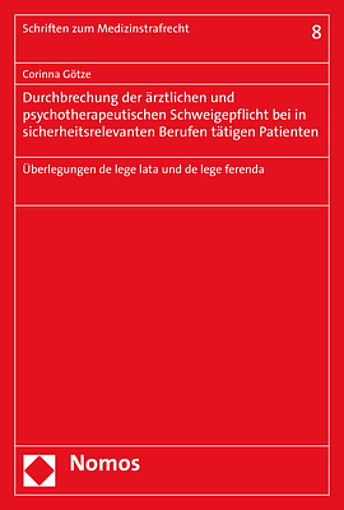englischThis study deals with a fundamental problem of medical law, which has increasingly moved into political focus since Germanwings flight 4U9525 crashed in 2015: the necessity and possibility of and the criteria for breaching medical and psychotherapeutic confidentiality. The Germanwings tragedy reinforced demands for the possible relaxation of the legal provisions regarding breaches of medical and psychotherapeutic confidentiality, justifying new examination of the legal framework in this regard and the possible need for reform.
The work is organised into five sections. In the introductory section, the need for reform of the legal provisions regarding medical and psychotherapeutic confidentiality in safety-related areas is discussed, with the author taking into account the complexity of relaxing the law on breaches of confidentiality. The second part is a comprehensive study of the legal framework of the current state of research, taking into consideration medical ethics. This section focuses on the norm of § 203 of the StGB (Germany’s penal code) and its parameters. By examining the crash of the Germanwings flight in 2015 and its legal consequences, the study identifies a significant need for reform of the legal provisions regarding medical and psychotherapeutic confidentiality in its third section. What follows is an empirical study, including interviews with experts in the fields of psychotherapy and medicine. In the following section, a legislative proposal is developed from these results. Considering constitutional aspects, the author examines the proposal extensively, focusing especially on art. 2, section 1 in conjunction with art. 1, section 1 of Germany’s constitution, and also taking into account medical ethics. The fifth section demonstrates the relevance of the entire topic with reference to several events that occurred during the course of the author’s doctoral studies. Finally, the study concludes with a brief outlook for possible developments relating to this complex issue.
Die Arbeit behandelt mit der ärztlichen und psychotherapeutischen Schweigepflicht und deren Durchbrechungen ein Grundproblem des Medizinrechts, welches durch die Geschehnisse um den Absturz des Germanwings-Fluges 4U9525 im Jahre 2015 erneut in den Fokus der öffentlichen Wahrnehmung gerückt ist. Die in diesem Zusammenhang erhobenen rechtspolitischen Forderungen nach einer Lockerung der Schweigepflicht von Ärzten und Psychotherapeuten rechtfertigten einen erneuten Blick auf die rechtlichen Rahmenbedingung und der Untersuchung eines möglichen Reformbedarfs.
Die Arbeit ist in fünf Abschnitte gegliedert:
1. Einleitung: Bestehen eines Anfangsverdachts hinsichtlich eines Reformbedarfs für einer Durchbrechung der ärztlichen und psychotherapeutischen Schweigepflicht im sicherheitsrelevanten Bereich
2. Umfangreiche Untersuchung der rechtlichen Rahmenbedingungen hinsichtlich des aktuellen Forschungsstands unter Einbeziehung medizinethischer Postulate
3. Eigenständige Untersuchung des bestehenden Reformbedarfs ausgehend von einer Darstellung des Absturzes des Germanwings-Fluges 4U9525 und der aus diesem Vorkommnis bislang gezogenen rechtlichen Konsequenzen. Präsentation von Ergebnissen aus eigener empirischen Forschung im Rahmen derer Experten aus dem psychotherapeutischen- und medizinischen Bereich Interviews einer qualitativen Inhaltsanalyse unterzogen wurden.
4. Entwicklung eines Gesetzgebungsvorschlags aufgrund der zuvor erarbeiteten Erkenntnisse und gewonnenen Kritik. Prüfung des Vorschlags unter Einbeziehung von verfassungsrechtlichen Aspekten sowie Prinzipien der Medizinethik
5. Bestätigung der Aktualität anhand sich ereigneter Vorfälle und Ausblick



